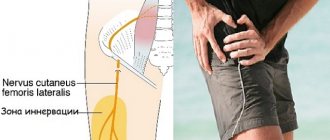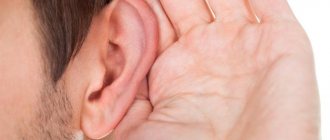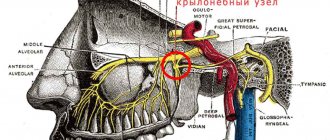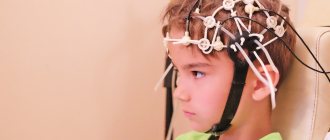If the cause of pain is a problem with bone tissue
Pain emanating from the bone and joint structures of the jaw can spread to the ear area.
Bone fractures
During accidents and other types of incidents, head injuries can occur, which cause fractures of the facial bones of the skull and jaw.
The most common injury accompanied by jaw pain is a jaw fracture. It occurs due to the great force of the blow applied to the face, which is why pain is felt in the jaw in the ear area.
This type of fracture can be identified by symptoms:
- hematoma at the fracture site;
- pain when trying to open your mouth and chewing;
- swelling of the tissues; with a severe fracture, severe swelling is possible, spreading to the face;
- With complex fractures, bones are displaced and the soft tissues of the oral cavity are damaged.
Important: after a strong blow, dislocation of the jaw joint is also possible, in which case pain will be observed during chewing movements.
Osteomyelitis of the jawbone
This disease is characterized by damage to the bone tissue of the jaw. It occurs under the influence of pathogenic microorganisms that penetrate the bone through the root canals of diseased teeth. This disease is considered a consequence of neglected dental problems and not timely treatment of pulpitis.
In addition to pain in the jaw and ear, symptoms include:
- increased body temperature, feeling of chills;
- swelling of facial tissues and the appearance of its asymmetry;
- lymph nodes increase in size.
This disease is very dangerous and requires qualified treatment.
Important: prolonged pain of a nagging and aching nature requires mandatory consultation with a doctor, because these symptoms are typical in the presence of neoplasms.
Possible complications
If measures are not taken in a timely manner, there is a possibility of developing unpleasant and even dangerous complications:
- paralysis of facial muscles, complete weakening of muscles;
- “hare's eye”, when the eyelid does not have the opportunity to close completely;
- Hunt's syndrome, in which the ear on the affected side of the face suffers, becoming covered with an unpleasant rash;
- any other neuralgia that can affect any nerve.
There is no need to self-medicate and trust only traditional medicine. No action without diagnosis and consultation with a doctor can be effective. In cold weather, try to dress warmly and avoid drafts and hypothermia.
1. Causes of dysfunction
One of the important nerve formations emanating from the cerebellum ends in the facial region. The splitting branch knot is divided into three parts. This is the trigeminal nerve. It is highly sensitive and is involved in jaw movement. In the case when the trigeminal nerve has a cold, we react sharply to this.
If the trigeminal nerve is cold, treatment cannot be avoided. Because in addition to disrupting its functionality, severe pain is felt and severe damage to the fiber occurs.
The reasons for the onset of the inflammatory process may be:
- as damage to the fiber itself;
- so infection;
- and various kinds of metabolic disorders in the body and even tumors.
Anatomical location of the sensory-motor formation
If the cause of pain is joint problems
Disturbances in the functioning of the temporomandibular joint can cause pain spreading from the jaw to the ear. Patients describe their sensations as if their ear hurts when they move their jaw. Inflammatory processes occurring in the joint limit its normal motor ability.
Diseases such as arthritis and arthrosis affect joints; these degenerative phenomena destroy joint tissue, causing the patient a lot of inconvenience. The pain is more often described as aching, pressing. There is a feeling of a joint clicking when moving, a feeling of clinging. After sleep, stiffness in movements is felt. When pressing on the joint area, pain occurs.
Inflammation can occur due to hypothermia of the joint area; it is not uncommon for a person to be blown away. Along with the joint, other organs, such as the ear and nerves, can also become hypothermic. Hypothermia can cause problem teeth to ache.
Photos and videos in this article will demonstrate the nature of the origin of pain during degenerative processes in the joint.
Surgical intervention
If medication does not show positive results, doctors resort to surgical methods. But only a small percentage of patients fall under this figure.
With the help of surgery, destruction is carried out, after which relief comes and the pain goes away. Special chemicals or radio waves are injected into the area of the affected nerve to reduce the sensitivity of the nerve.
In severe cases of damage, the patient is admitted to a hospital, where doctors decompress the trigeminal nerve to completely relieve pain and relieve swelling from the face. By adjusting the arteries and their location, the trigeminal nerve is freed and does not cause discomfort. After surgery, it may take several days for the effects to be felt.
If the cause of pain is neuralgia
Simultaneous pain in the ear and jaw occurs due to neuralgia of the cranial nerves passing in this area.
The pain has a different character:
- burning long-term pain;
- short-term shooting pain;
- pain may be of a jerking nature.
In the area of the ear and jaw joint there is a place where the fibers of the trigeminal nerve exit to the surface of the skull. This nerve is characterized by increased pain in the late evening and at night.
Neuralgia pain can be very painful
Also another situation why the jaw and ear hurt is neuralgia of the laryngeal nerve. Then the source of pain will be felt in the larynx, from which the pain will spread to the jaw and ear. Pain is felt on the left or right side, and bilateral pain can also spread. It occurs when you move your head, blow your nose, or cough.
Cases of neuralgia of the glossopharyngeal nerve are very rare. Attacks of pain in this case radiate to the temporomandibular joint, pharynx, eye and ear. A common symptom is the occurrence of a causeless dry cough.
Important: with all types of neuralgia, pain intensifies when eating very cold or very hot food.
Diagnosis and treatment
When a patient first experiences symptoms of trigeminal neuralgia, they should first be examined by a physician and dentist to identify symptoms and prescribe treatment. If the examination does not produce results, a more in-depth diagnosis is carried out by a neuropathologist and neurosurgeon. During the examination, the doctor examines areas of the face in order to determine which branch of the trigeminal nerve leads to pain.
Most causes of trigeminal neuralgia are not serious diseases, but the presence of a tumor or sclerosis cannot be ruled out. For a more accurate diagnosis, a magnetic resonance scan is necessary.
To treat the disease, doctors have a number of therapeutic measures at their disposal. Medicines, injections, surgery and radiation therapy are used to relieve pain. Each type of treatment has its own advantages and disadvantages. Only an experienced doctor can determine which type of treatment is appropriate in each case.
If the cause of pain is dental problems
Important: through teeth affected by caries, pathogenic microorganisms can penetrate through the roots into neighboring tissues and cause severe inflammatory processes and illnesses.
Growing wisdom teeth can cause many problems
Soreness in the ear or jaw is often the result of dental problems, such as:
- Untreated caries may not be visible externally. For example, hidden caries is not noticeable to the patient; it will only make itself felt by painful sensations, such as pain in the ear, pain in the jaw.
- Pulpitis can be so painful that it is sometimes difficult to recognize the source of the pain. Pulpitis is characterized by prolonged pain at night. Also pain that renews from cold and hot foods, which does not go away for a long time.
- Wisdom teeth that are incorrectly positioned in the gums will put pressure on surrounding teeth or injure soft tissues when they start to grow. Pain provoked by pressure can radiate to the angle of the jaw and ear, so that a person may not immediately understand the source of the pain.
- Even if the wisdom tooth is positioned correctly, when it erupts, pain is possible, which can be felt in neighboring tissues. Sometimes the eruption of a wisdom tooth is accompanied by an inflammatory process of the gum hood above the tooth itself.
- Periodontal abscess is a serious exacerbation of dental problems. The pain from it spreads to the jaw, eyes and ears. The sensations are pulsating in nature, the pulsation comes from the root of the tooth. With this problem, there may be a decrease in the sensitivity of the receptors in the lower lip, as well as a weakening of the masticatory muscles.
- If a person has recently had braces or dentures installed, during the adaptation period there will be discomfort, even pain. This phenomenon should go away, if this does not happen, then you should consult your doctor; it may be necessary to adjust the installed structure.
- Advanced inflammation of the gums or periodontitis can cause anxiety in the form of pain radiating to the jaw joint and ear.
Important: one of the complications of untimely treatment of caries and pulp inflammation is the formation of a cyst, in which a person will experience pain that resonates in the surrounding tissues.
What to do to avoid hypothermia?
In order to get a cold as little as possible, without looking for someone to turn to and how to treat the ailment, follow simple prevention methods:
- Never go out into the cold in winter without a hat to prevent frostbite on your head.
- Avoid drafts to avoid overcooling your head.
- Toughen up.
- Exercise to strengthen your immune system.
- Practice good hygiene and wash your hands frequently to avoid bacterial infections.
- Drink more vitamin drinks and eat healthy foods.
If, after all, a cold has caught up with you, you should not treat a cold at home and swallow everything. Visit your doctor and follow his treatment recommendations to avoid unpleasant complications.
Symptoms of nerve colds are usually localized at the site of inflammation.
Pathological irritation of nerve endings begins suddenly and is very painful. The causes of this condition include drafts, intoxication, infections, and allergies. In the absence of professional treatment, inflammation may become chronic, which will require long-term drug treatment or surgery to eliminate.
If the cause of pain is an inflammatory process of the ENT organs
If your ear and jaw hurt, you may also have a sore throat
Sinusitis
Pain in the ear and jaw often bothers a person who has inflammation of the maxillary sinuses. The pain has a right-sided or left-sided localization.
The areas that become painful are:
- upper jaw;
- ear;
- eye;
- the area where the sinus is located, away from the nose.
Patients often suffer from headaches. Unpleasant sensations increase significantly at night and when the body is tilted.
Important: inflammation of the sinuses is very dangerous due to its complications due to their close location to the brain.
If a person suspects he has sinusitis, he should immediately consult a doctor and begin treatment.
Tonsillitis
Inflammation of the pharyngeal tonsils causes severe pain in the throat, which can spread to the lower jaw and ear. Such severe pain prevents a person from eating, drinking, or talking. The temperature rises, the symptoms of intoxication of the body increase. Inflammation from the tonsils spreads to surrounding tissues.
Otitis
With inflammation of the outer and middle parts of the ear, there will be a sensation that the jaw under the ear hurts. In case of inflammatory processes of the outer ear, there may be a lump in the area around the auricle or the lump will be located directly on the auricle.
If inflammation of the middle ear has developed, the pain will be stronger. It spreads to nearby tissues, the jaw, teeth, eyes. The pain feels sharp and shooting. The body temperature increases, the patient looks lethargic and broken.
Important: inflammatory processes in the ear must be treated by a doctor; in the event of complications, inflammation may spread to the inner part of the ear, which can cause hearing problems.
How to treat a cold head at home?
What to do if you have a cold? Which doctor should I contact, how to understand how to treat the ailment?
- if your ear, throat, or nose hurt, see an otolaryngologist;
- in case of nerve damage, a neurologist will help;
- the treatment of acute respiratory viral infections is carried out by a therapist;
- For conjunctivitis, an ophthalmologist is recommended.
The right decision would be to first contact a therapist, who, after examining and listening to complaints, will refer the patient to specialized specialists.
First aid
If your head is cold and it hurts, some advice from doctors that can be easily implemented at home will help:
- provide yourself with bed rest for several days;
- limit the consumption of fatty, fried, salty, smoked foods;
- do not smoke or drink alcohol;
- At the first sign of a cold, you should drink tea with lemon, honey, and raspberries. A flock of rose hips, fruit and berry juices, and natural juices help well;
- provide dry warmth to the head (tie it with a down scarf, apply hot salt or semolina).
If the symptoms of a head cold are too severe, try treatment with tablets. What to take?
Folk remedies
Treatment with folk remedies will help get rid of unpleasant cold symptoms:
- Brew medicinal plants: chamomile, eucalyptus, St. John's wort, add a little mint and sea buckthorn oils to the decoction. Pour the resulting broth into a wide container, bend over it and inhale the vapors for 15 minutes, covering the top with a terry towel.
- If there is a draft, your ear hurts and shoots, grate the onion and squeeze out the juice. Place 2-3 drops into the sore ear and cover the top with a cotton swab. Within 20 minutes the pain will go away.
Treatment plan, trigeminal nerve cold, how to treat
A very painful process, with acute pain, involuntary contractions of the face, if a woman has a cold, the trigeminal nerve will not remain and is not outwardly noticed. The change on one side of the face is most clearly visible. In this case, a burning sensation and crawling indicate a severe disruption of the functioning of the branch. Whenever the trigeminal nerve has a cold, treatment should be carried out comprehensively. To begin with, a diagnostic examination (CBC, X-ray, ultrasound) determines the extent of the lesion and the probable cause. And then, they prescribe for those who have a cold of the trigeminal nerve how to treat the condition.
Taking biomaterial from a finger for blood testing
The direction of therapy will depend on the cause of activation of the inflammation process:
- for cases of illness caused by a virus, antiviral drugs may be prescribed;
- if the origin is bacterial, antibiotics;
- for hypothermia, vitamin therapy and a number of anti-inflammatory drugs.
Vitamins are required to be prescribed in all cases. Since it is necessary to restore conductivity, which can be achieved with the correct process of feeding the reaction pathways with the necessary nutrients.
Non-steroidal drugs are often prescribed. Ketarol and Nimesil help relieve inflammation. The attacks are relieved with novocaine blockades. Treatment is complemented by physiotherapy.
Physiotherapy
View gallery
Physiotherapy is carried out after complete elimination of the acute inflammatory process. They help prolong the period of remission. Most often used:
- Phonophoresis with hydrocortisone. It is carried out even in the acute stage, to reduce the frequency of pain attacks.
- Electrophoresis with anti-inflammatory or analgesic agents.
- Magnetotherapy.
- Laser irradiation.
- Ultraviolet heating.
- Acupuncture.
- UHF.
Physiotherapy helps relax muscles, help restore blood circulation, and improve muscle tone.
Nerve inflammation in the hand
The hand is innervated by several nerve bundles, but in the case of negative effects of exogenous and endogenous factors, the radial, median and ulnar nerves most often suffer. The main causes of pathology include:
The following symptoms indicate a cold in the nerve of the hand:
- sharp and aching pain in the shoulder and arm;
- swelling of the affected limb;
- partial paresis;
- limited limb mobility;
- numbness of fingers;
- decreased hand sensitivity;
- increased pain with muscle tension.
List of the most effective drugs
How to cure a cold nerve? To quickly block inflamed nerve bundles and treat them, the following types of medications are used:
- "Sirdalud" is a muscle relaxant, the components of which act on skeletal muscles, promoting its relaxation;
- Finlepsin is an anticonvulsant drug that eliminates muscle spasms. Has anti-inflammatory and analgesic effects;
- Cymbalta is an antidepressant used in the treatment of peripheral neuropathy. Eliminates irritation and promotes normal sleep;
- "Sulindac" is a non-steroidal anti-inflammatory drug that accelerates the process of regeneration of nerve fibers;
- "Metypred" is a glucocordicosteroid hormone that promotes the synthesis of lipocortin, which reduces inflammation.












